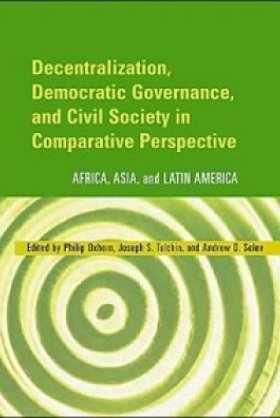Decentralization, Democratic Governance, and Civil Society in Comparative Perspective: Africa, Asia, and Latin America

-
Decentralization, Democratic Governance, and Civil Society in Comparative Perspective studies the relation of decentralization to democratization at both intermediate and local levels and analyzes how decentralization is transforming the relationship between the state and civil society. This book presents case studies from six countries in three continents in which decentralization of some parts of government has been attempted: Mexico, Chile, South Africa, Kenya, the Philippines, and Indonesia.
The work surveys a range of issues in decentralization: which actors in each country have been most responsible for initiating and sustaining decentralization; how much decentralization to regional and local authorities has transformed the state; and whether stronger local governments produce greater accountability to citizens. The final chapter by Tulchin and Selee draws conclusions on these issues based on the case studies, while the introduction by Philip Oxhorn lays a theoretical foundation for understanding the relationship between decentralization and democracy.
Philip Oxhorn is a professor of political science and associate dean at McGill University. Joseph S. Tulchin is director of the Latin American Program at the Woodrow Wilson International Center for Scholars. Andrew D. Selee is director of the Mexico Institute at the Wilson Center.
Editors
 Joseph S. TulchinSenior Scholar
Joseph S. TulchinSenior Scholar Andrew SeleeFormer Executive Vice President and Senior Advisor to the Mexico Institute;
Andrew SeleeFormer Executive Vice President and Senior Advisor to the Mexico Institute;
President, Migration Policy InstituteBrowse Insights & AnalysisExplore More
Browse Insights & Analysis
Greenland’s New Governing Coalition Signals Consensus
Posted date/time:
Myanmar’s Junta and the 2026 Elections: A Fig Leaf for Legitimacy?
Duration:15.24Posted date/time:
Imamoglu’s Arrest Sparks Nationwide Unrest and Raises Fears for Turkish Democracy
Duration:2:32Posted date/time:
